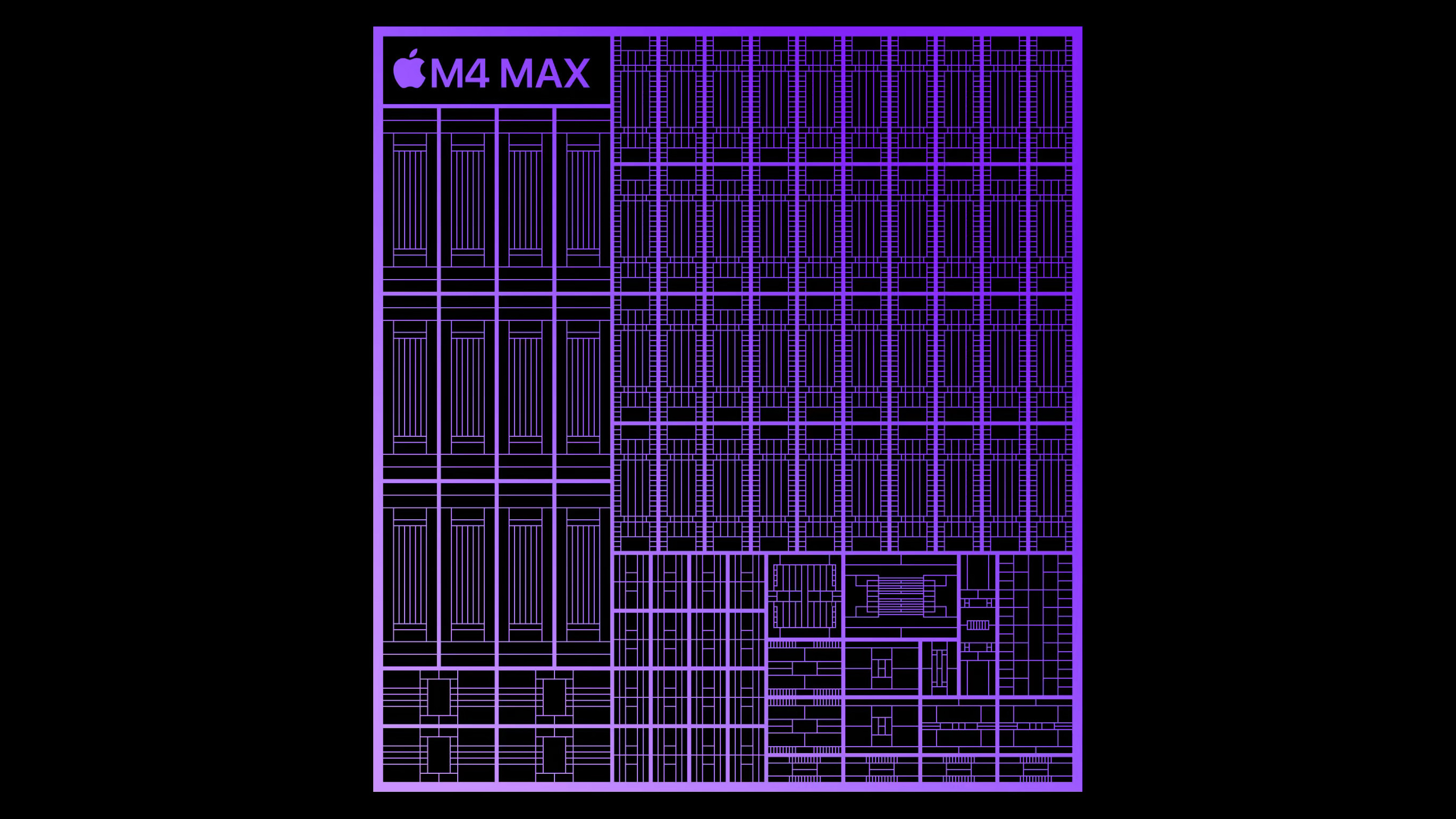Apple's M4 Max is the single-core performance king in Geekbench 6 — M4 Max beats the Core Ultra 9 285K and Ryzen 9 9950X
All that power is in a small package.

Benchmarks of Apple's newly launched M4 Max have started to surface at Geekbench. Unsurprisingly, Apple has retained its performance crown and has taken over at the helm of Geekbench as the fastest chip. Even the multi-core performance puts Intel's and AMD's latest offerings to shame, that too at a fraction of the power.
The test bench features the new 16-inch MacBook Pro, which hosts the M4 Max in all its glory. Apple's latest and updated design allows the M4 Max to blaze through the benchmark—scoring 4,060 points in the single-core test and 26,675 points in the multi-core test. The M3 Max results were taken from the Geekbench 6 database, while the remaining results are from our reviews of the processors.
The M4 Max has secured the single-core crown in Geekbench 6. The chip was roughly 30% faster than last year's M3 Max in single-core performance and 27% in multi-core performance.
On the x86 end, AMD and Intel pale in contrast. The M4 Max handily keeps up even in multi-core at a fraction of the power—beating Intel's Core Ultra 9 285K by around 19% in the single-core category and 16% in the multi-core category. Compared to the Ryzen 9 9950X, the M4 Max showed 18% higher single-core performance and 25% higher multi-core performance.
| Processor | Single-Core Score | Multi-Core Score |
| M4 Max | 4,060 | 26,675 |
| Ryzen 9 9950X | 3,434 | 21,399 |
| Core Ultra 9 285K | 3,422 | 22,954 |
| M3 Max (16 CPU cores) | 3,.128 | 20,928 |
The M4 Max is Apple's flagship SoC targeted at data scientists, 3D artists, and professionals. The top-end configuration packs 16 CPU cores (twelve performance and four efficient) and 40 GPU cores alongside up to 128GB of unified memory - accessible by both the CPU and GPU. Apple has also kitted its new MacBook Pro lineup with support for Thunderbolt 5, delivering speeds of up to 120 Gb/s.
Apple's new M4 lineup is a solid response to the latest AI PC wave from Intel, AMD, and Qualcomm. While the performance outlook is excellent, pricing remains a concern since Apple has always charged a premium for its products. The full-fat M4 Max configuration in question will set you back $3,999. Content creators and productivity-centric users might eye laptops with dedicated graphics solutions at that price point.
Geekbench isn't the best benchmark for comparing chips. Therefore, it'll be interesting to see how the M4 Max performs in something like Cinebench or HandBrake to see whether Apple's latest chip still beats the competition. The M4 Max-powered MacBook Pro 2024 deliveries are set to begin on November 8, so we'll soon see what the M4 Max can do.
Get Tom's Hardware's best news and in-depth reviews, straight to your inbox.

Hassam Nasir is a die-hard hardware enthusiast with years of experience as a tech editor and writer, focusing on detailed CPU comparisons and general hardware news. When he’s not working, you’ll find him bending tubes for his ever-evolving custom water-loop gaming rig or benchmarking the latest CPUs and GPUs just for fun.
-
Marco- Honestly I could not give an f about having the fastest machine, what I do care about is getting out my laptop knowing the battery won’t be flat, I consistently gravitate to my m2 MacBook Air for this reason, every dell, HP and Microsoft laptop I have ever owned the power management is just hopeless.Reply -
bit_user I like that Geek Bench is cross platform and all, but I hate what a black box it is. Who the heck knows exactly what it tests, or how well-optimized it is for different ISAs? Or how it's even compiled?Reply
I wish more people would use SPECbench. At least that's based on well-known, open source software packages. ChipsAndCheese recently started running it (perhaps partly because Anandtech is now defunct), but they have yet to benhcmark any Apple hardware.
Geek Bench multi-core is trash. I don't know what it does, but you can clearly see that it scales very poorly with core count. Much worse than most multi-threaded software people usually benchmark.The article said:The M4 Max handily keeps up even in multi-core at a fraction of the power -
aaronage Reply
Primate Labs publishes all these details:bit_user said:I like that Geek Bench is cross platform and all, but I hate what a black box it is. Who the heck knows exactly what it tests, or how well-optimized it is for different ISAs? Or how it's even compiled?
I wish more people would use SPECbench. At least that's based on well-known, open source software packages. ChipsAndCheese recently started running it (perhaps partly because Anandtech is now defunct), but they have yet to benhcmark any Apple hardware.
Geek Bench multi-core is trash. I don't know what it does, but you can clearly see that it scales very poorly with core count. Much worse than most multi-threaded software people usually benchmark.
https://www.geekbench.com/doc/geekbench6-benchmark-internals.pdfThis doc ^ describes all the test cases, which ISA extensions are used, how the scores are weighted, why multi-core scales the way it does etc.
Geekbench is way overhated online. It’s a fairly reliable way to measure the relative performance of chips. It just offends fanboys who want to see bigger numbers for their brand(s) of choice.
Apple Silicon scores highly in Geekbench simply because it’s fast. There’s no sleight of hand - e.g. Apple’s designs are particularly strong for compiling so they score highly in the clang test 🙂 -
bit_user Reply
Thanks, I'll have a look.aaronage said:Primate Labs publishes all these details:
Maybe, once I have a better understanding of what it's actually measuring.aaronage said:It’s a fairly reliable way to measure the relative performance of chips.
IMO, what's really needed is to demonstrate its predictive power by showing how it correlates to the performance of other apps.
Not in my case. I've been accused on here of being an Apple fan, just because I respect their tech. I would never buy one, but that's a different matter.aaronage said:It just offends fanboys who want to see bigger numbers for their brand(s) of choice. -
nrstickley You can't determine the relative performance of two CPUs if they are running vastly different operating systems and the software was compiled with different compilers. Compilers and OS kernels are hugely important for performance. There's often a huge difference in performance between Windows and Linux running on the same hardware. There are even significant performance differences between different Linux distros and different versions of Windows.Reply -
aaronage Reply
Sorry, didn’t mean to accuse you of being a fanboy - was supposed to be a more general comment (Geekbench always gets caught up in the whole PC vs. Mac nonsense)bit_user said:Thanks, I'll have a look.
Maybe, once I have a better understanding of what it's actually measuring.
IMO, what's really needed is to demonstrate its predictive power by showing how it correlates to the performance of other apps.
Not in my case. I've been accused on here of being an Apple fan, just because I respect their tech. I would never buy one, but that's a different matter. -
TheHerald Reply
The MT portion of GB6 is just terrible.aaronage said:Primate Labs publishes all these details:
https://www.geekbench.com/doc/geekbench6-benchmark-internals.pdfThis doc ^ describes all the test cases, which ISA extensions are used, how the scores are weighted, why multi-core scales the way it does etc.
Geekbench is way overhated online. It’s a fairly reliable way to measure the relative performance of chips. It just offends fanboys who want to see bigger numbers for their brand(s) of choice.
Apple Silicon scores highly in Geekbench simply because it’s fast. There’s no sleight of hand - e.g. Apple’s designs are particularly strong for compiling so they score highly in the clang test 🙂 -
aaronage Reply
OS is always a factor regardless of the benchmark. The difference between platforms was much greater in earlier versions of Geekbench that used different compilers for each OS. Now that clang is used for every build, there’s a much smaller difference between Windows, Linux and macOS (though there is still an advantage for Linux in general).nrstickley said:You can't determine the relative performance of two CPUs if they are running vastly different operating systems and the software was compiled with different compilers. Compilers and OS kernels are hugely important for performance. There's often a huge difference in performance between Windows and Linux running on the same hardware. There are even significant performance differences between different Linux distros and different versions of Windows. -
abufrejoval Reply
That document isn't extremely rich on details, and it certainly doesn't contain source code.aaronage said:Primate Labs publishes all these details:
https://www.geekbench.com/doc/geekbench6-benchmark-internals.pdfThis doc ^ describes all the test cases, which ISA extensions are used, how the scores are weighted, why multi-core scales the way it does etc.
Geekbench is way overhated online. It’s a fairly reliable way to measure the relative performance of chips. It just offends fanboys who want to see bigger numbers for their brand(s) of choice.
Apple Silicon scores highly in Geekbench simply because it’s fast. There’s no sleight of hand - e.g. Apple’s designs are particularly strong for compiling so they score highly in the clang test 🙂
There is no reliable way of measuring relative performance any more, because these days each architecture has significant assumptions about how it is going to be used built into it.
Lunar Lake and Arrow Lake are prime examples of how differently Intel executed similar ingredients to match very distinct use cases. And if you try condensing 128/192 P/E Xeons or power/dense EPYCs into the same two numbers, that won't be meaningful either.
Do they deserve to be hated? Certainly not.
Should they be less quoted or interpreted as a meaningful differentiator: certainly so.
Is there a sleigh of hand? Absolutely, if only in favoring short bursty workloads for both exploiting mobile thermals and quick results.
Does it man that Apple silicion is actually slow? Of course not. I just wish you could buy it at reasonable prices and without becoming an iSlave. -
JamesJones44 Reply
I agree, the M4 Max does not seem to scale as well in Cinebench R23 where it scores a 25881 for multicore. Still an amazing score for the power envelope, but not the beast that Geekbench seems to make it look like.bit_user said:Geek Bench multi-core is trash. I don't know what it does, but you can clearly see that it scales very poorly with core count. Much worse than most multi-threaded software people usually benchmark.
https://nanoreview.net/en/cpu/apple-m4-max-16-core